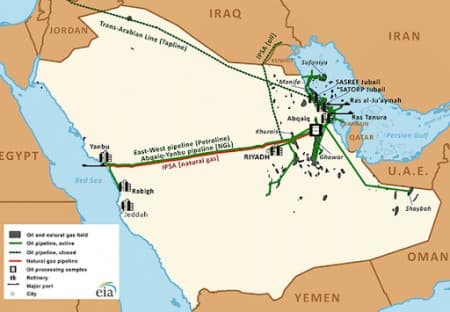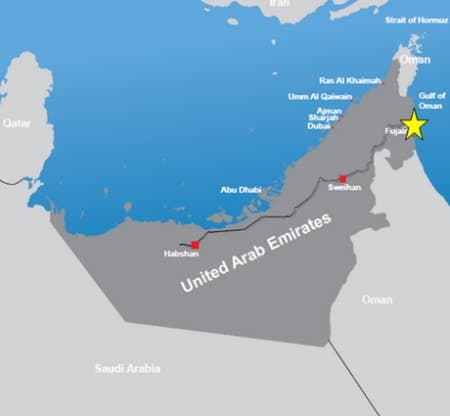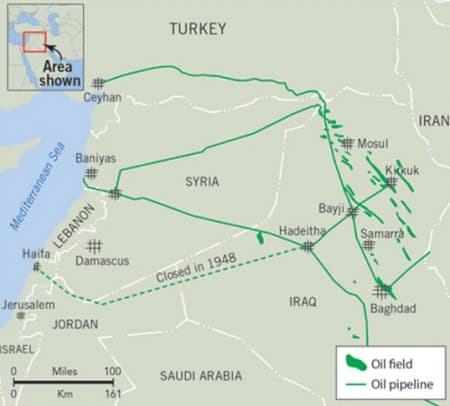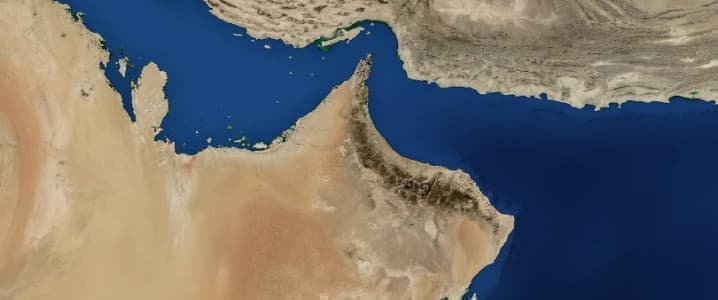Oil is sometimes referred to as ‘black gold’. The discovery and export of fossil fuels have led to tremendous wealth creation for certain countries. In this sense, no region in the world is more blessed than the Middle East. Especially the countries surrounding the Persian Gulf are rich in oil and gas deposits. Unfortunately, political instability is almost a synonym for the Middle East. The risk of supply disruptions is a significant threat for those heavily reliant on fossil fuel sales. Therefore, risk mitigation is an important part of the business.
The antagonism between Iran and the U.S. escalated significantly under President Trump. According to sources, Washington came close to acting militarily but the President was dissuaded when informed on the risks and potential losses. Skyrocketing oil prices are one of those consequences as Tehran has repeatedly threatened to close off the Strait of Hormuz in case it is attacked. Approximately 20 percent of the world’s oil travels through the narrow strait separating mainland Iran from Oman and the UAE. Even a short disruption of supplies will most definitely have a devastating effect on prices. Circumventing the Strait, therefore, is essential to maintain exports to markets.
While Iran has been the most vocal when it comes to threats concerning the Strait, it has a contingency plan if the situation escalates. The country is currently building a pipeline from Goreh near the border with Iraq and Kuwait where the majority of the country’s oil is produced to Jask on the Gulf of Oman. The project is slated to be finished in March 2021 and has a capacity of one million barrels per day (mbpd).

Saudi Arabia, also, is extremely vulnerable to a closure of the Strait of Hormuz. The majority of the country's oil resources are located in the eastern region on the Persian Gulf. To mitigate the effects of a potential crisis involving Iran and the Strait, Riyadh has ordered the expansion of the East-West pipeline. After it has been finished, the pipeline has the capacity for 7 mbpd, which is approximately 61 percent of what the country produced on average in 2019.
Related: Oil Is Key In Russia’s Rapprochement With Azerbaijan

Furthermore, the UAE operates the Abu Dhabi Crude Oil Pipeline (ADCOP) since 2014 that connects processing facilities at Habshan in the western region with Fujairah on the Gulf of Oman. The pipeline has a capacity of 1.5 mbpd. After the normalization of ties with Israel, the UAE is now working on alleviating alternative chokepoints such as the Suez Canal by using the Eilat-Ashkelon pipeline from the Red Sea to the Mediterranean.

Iraq is the second-biggest oil producer in OPEC after Saudi Arabia. The country desperately needs the funds from oil sales to rebuild after nearly two decades of war. Fortunately, Iraq’s geography offers alternatives to transportation through the Strait.
The Kirkuk-Ceyhan pipeline in Northern Iraq has been crucial for the export of oil from inland fields near the city of Kirkuk to Turkish ports. Its significant capacity of 1.5 mbpd makes it an important part of Iraq’s export capacity. Furthermore, the country could use two defunct pipelines through Syria to the Mediterranean Sea. Unfortunately, the ongoing conflict and instability in Syria rule out activities any time soon. Related: Oil Markets Are Finally Ready To Recover

An alternative, however, is a pipeline through neighboring Jordan. Political relations between Bagdad and Amman are very good where economic activities usually follow. The countries envisage a $5 billion project to move oil from inland sources to the port city of Aqaba. These plans have been somewhat delayed due to the Covid-19 pandemic and the instability in Iraq's Anbar province.

Despite these initiatives, the Strait of Hormuz will remain a crucial waterway. Any disruption will lead to significant increases in oil prices. Therefore, incumbent president Biden is a welcome reprieve from the bellicose language concerning Iran. Stable commodity prices are essential for post-pandemic economic recovery. A conflict involving the Strait of Hormuz is the last thing the world markets can use at the moment.
By Vanand Meliksetian for Oilprice.com
More Top Reads From Oilprice.com:
- Traders Haven’t Been This Bullish On Oil Since August
- The Oilfield Service Industry Will Never Truly Recover
- How China Took Control Of Exxon’s Supergiant Iraqi Oilfield


















